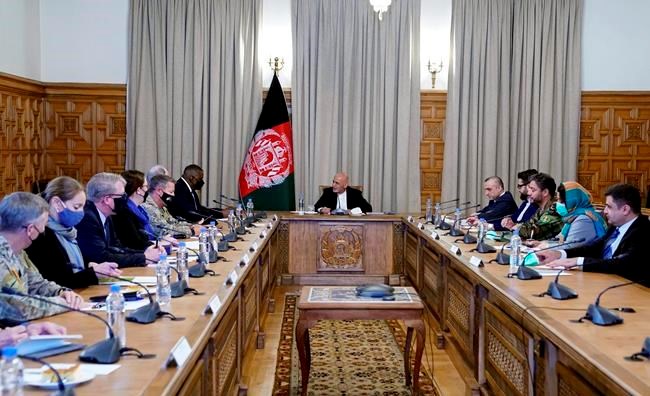KABUL — U.S.
With questions swirling about how long U.S. troops will remain in the country, Austin said that “in terms of an end date or setting a specific date for withdrawal, that’s the domain of my boss.” He said his stop in Kabul, the capital, where he met with military commanders and senior Afghan government officials, including President Ashraf Ghani, was intended to let him “listen and learn” and “inform my participation” in reviewing the future of the American force.
President Joe Biden said last week in an ABC News interview that it will be “tough” for the U.S. to meet a May 1 deadline to withdraw troops from Afghanistan. But Biden said that if the deadline, which is laid out in an agreement between the Trump administration and the Taliban, is extended, it wouldn’t be by a “lot longer.”
Austin, who arrived after a visit to India, said: “There’s always going to be concerns about things one way or the other, but I think there’s a lot of energy focused on, you know, doing what’s necessary to bring about a responsible end, a negotiated settlement to the war.”
The Taliban on Friday warned of consequences if the United States doesn’t meet the deadline. Suhail Shaheen, a member of the Taliban negotiation team, told reporters that if American troops were to stay beyond May 1, “it will be a kind of violation of the agreement. That violation would not be from our side. ... Their violation will have a reaction.”
A statement released by the presidential palace on the Ghani-Austin meeting said both sides condemned the increase in violence in Afghanistan. There was no mention of the May 1 deadline. Washington is reviewing the agreement the Trump administration signed with the Taliban last year and has been stepping up pressure on both sides in the protracted conflict to find a swift route to a peace agreement.
“It’s obvious that the level of violence remains pretty high in the country," Austin said. "We’d really like to see that violence come down and I think if it does come down, it can begin to set the conditions for, you know, some really fruitful diplomatic work.”
In a sharply worded letter to Ghani earlier this month, U.S. Secretary of State Antony Blinken said it was urgent to make peace in Afghanistan and that all options remained on the table. He also warned that it was likely the Taliban would make swift territorial gains if U.S. and NATO troops withdrew. The United States spends $4 billion a year to sustain Afghanistan’s National Security Forces
The Taliban warned America against defying the May 1 deadline, at a news conference in Moscow, the day after meeting with senior Afghan government negotiators and international observers to try to jumpstart a stalled peace process to end Afghanistan’s decades of war.
Washington has given both the Taliban and the Afghan government an eight-page peace proposal, which both sides are reviewing. It calls for an interim “peace government” that would shepherd Afghanistan toward
Ghani has resisted an interim administration causing his critics to accuse him of clinging to power. He says elections alone would be acceptable to bring a change of government.
Both the U.S. and Kabul have called for a reduction in violence leading to a cease-fire. The Taliban say a cease-fire would be part of the peace negotiations. The insurgent movement has not attacked U.S. or NATO troops since signing the agreement.
But U.S. military commanders and NATO leaders have argued that the Taliban have not lived up to their part of the peace agreement, which includes a reduction in violence and a separation from al-Qaida and other terrorist groups.
Austin said he was confident in the ability of Gen. Austin Miller, the commander of U.S. forces in Afghanistan, to accomplish his mission “with the resources he has” and to protect American troops.
NATO Secretary-General Jens Stoltenberg said last month that the alliance “will only leave when the time is right” and when conditions have been met.
“The main issue is that Taliban has to reduce violence, Taliban has to negotiate in good faith and Taliban has to stop supporting international terrorist groups like Al Qaeda,” he said.
Austin has said little on the record about the stalemate. After a virtual meeting of NATO
Austin’s stop in Afghanistan was his first return to a U.S. war zone in the Middle East since taking the Pentagon post. But he spent a great deal of time in the region during his service as an Army commander.
Austin, a retired four-star general, served in Afghanistan as commander of the 10th Mountain Division. From 2013-2016 he was the head of U.S. Central Command, which oversees the wars in Iraq and Afghanistan.
The Afghanistan visit comes at the end of Austin’s his first overseas trip as secretary. After a stop in Hawaii, he went to Japan and South Korea, where he and met with their
___
Baldor reported from Washington. Associated Press writer Kathy Gannon in Islamabad contributed to this report.
Lolita C. Baldor And Rahim Faiez, The Associated Press



